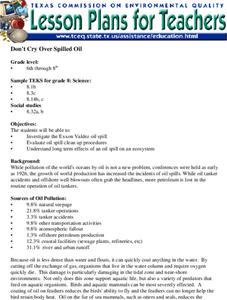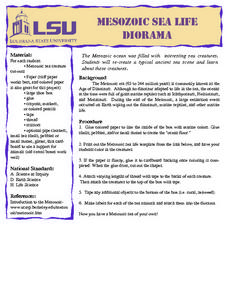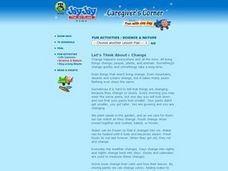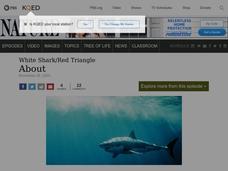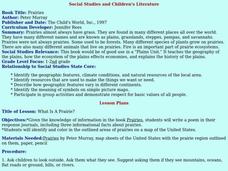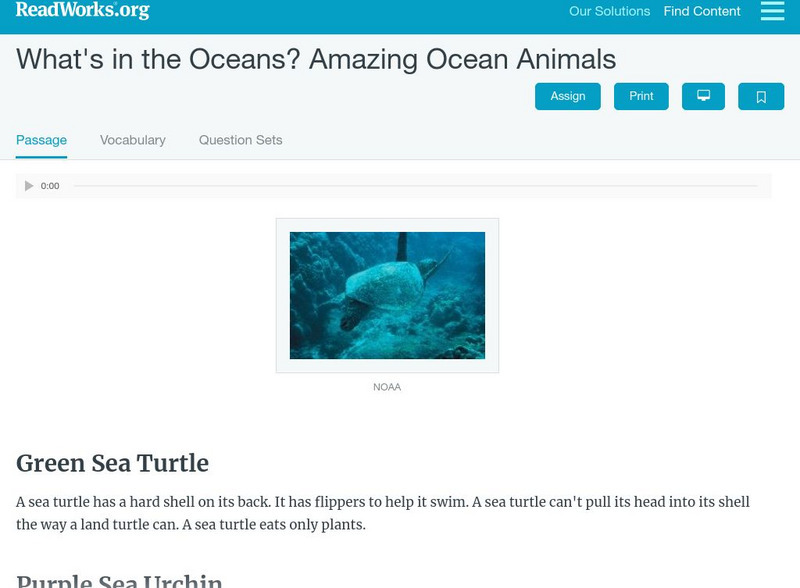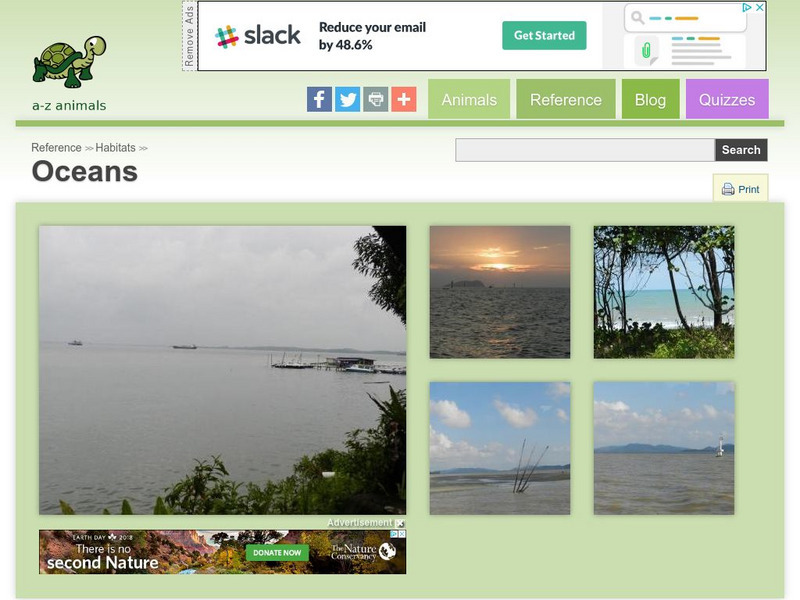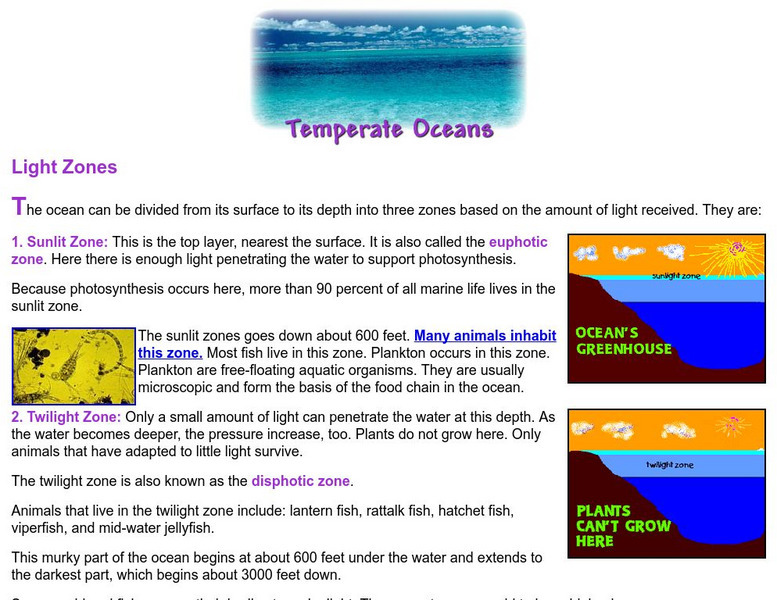Curated OER
Don't Cry Over Spilled Oil
Pupils study the Exxon Valdez Oil Spill while evaluating oil spill clean up activities. They discover the long term impact can have on an ecosystem by completing this experiment.
Curated OER
Marine Animals on the Move
Students complete a project based on collecting satellite data aimed at finding connections between organisms and the environment. They create a final project working with a partner to share with the class.
Curated OER
Alaska's Physical Systems and History
Students read about Alaska's physical systems and determine how Alaska's physical makeup has impacted its history. They create timelines of their particular physical system.
Curated OER
Noah's Ark, Revisited
Fourth graders do a visual presentation for a specific endangered species.
Curated OER
Ambush Warriors
Middle schoolers identify four different categories of reptiles and explain how snakes deliver their venom to their prey.
Curated OER
Mesozoic Sea Life Diorama
Students create a diorama depicting Mesozoic sea life. They color a template and add shells and pebbles to the diorama to depict the ocean floor.
Curated OER
Let's Think About Water
Students explore the different forms that water can take and conduct simple experiments to demonstrate some of its properties in each state. They watch a short video that illustrates some of these concepts.
Curated OER
Let's Think About... Change
Students observe various examples of "change." They mix paint to cereate new colors, eat bread and then toasted bread, and match baby pictures with pictures of how the same people look in the present. Finally, they watch a bouquet of...
Curated OER
Lets Think About...Plants
Students bring in various vegetables and make friendship soup. They plant seeds and discuss the things plants need to grow and thrive.
Curated OER
Environment: Methane Sources
Students discover how human activity is increasing the release of methane gas into the atmosphere. Woring in groups, they visit the Eduzone Website and complete worksheets. Students identify the natural and human causes of methane gas.
Curated OER
Africa
Second graders explore Africa. They label the popular places in Africa on a map. Students label the different cities and monuments that are popular in Africa. They discuss the similarities and differences between cities in Africa and...
Curated OER
Biodiversity Bird Hunt
Learners examine the influence of biodiversity on human culture through the use of birds. They brainstorm words that come to mind when they think of human cultures. They describe ways that human culture and biodiversity are linked.
Curated OER
Insect Biology and Ecology: A Primer
Pupils explore insects and closely related organisms. They examine the growth and development of a lady beetle. Students classify insects and organize them. They investigate pest management.
Curated OER
Shark Attack
Students examine the white shark. They think critically about a set of shark facts and predict whether the statements are true or false. Students describe a year in the life of a white shark living in the Red Triangle. They create a...
Curated OER
Social Studies and Children's Literature
Young scholars write a journal in response to literature. The story that is read is about prairies. The subject of prairies becomes an object for research. The culminating activity is the making of a map where prairies exist in the...
Curated OER
John Fitch: Pioneer Steamboat Inventor
Students explore the transportation revolution brought about through the use of steam power to move boats over water. They practice note taking skills by taking notes from an article.
Curated OER
Facts About Australia: Fill-In-The-Blank
In this geography worksheet on Australia, learners fill in blanks in a paragraph about Australia with words from a word bank; the paragraph contains basic facts about geography, settlement, etc.
World Wildlife Fund for Nature
Wwf: Our Earth: Ecoregions: Habitats: Oceans
An introduction and overview of the ocean habitat, the largest habitat on Earth. Includes links to information about three animals that live in this habitat.
Read Works
Read Works: What's in the Oceans? Amazing Ocean Animals
[Free Registration/Login Required] An informational text about some of the animals found in the ocean including: sea turtles, sea urchins, starfish, sea horses, and clownfish. A question sheet is available to help students build skills...
Australian Broadcasting Corporation
Australian Broadcasting Corporation: Oceans Alive: Jewels of the Sea
This site contains information on both animals and plants of the sea. View the large sea kelps and discover the animals that feed on the kelp.
A-Z Animals
A Z Animals: Reference: Habitats: Oceans
Learn about the ocean ecosystem, and how its characteristics affect the life within it.
Other
New England Aquarium: Climate Change and the Oceans
A series of videos accompanied by student activity sheets explore the impact of climate change on the ocean and the animals that live in and around it: sea turtles, jellies, whales, shore birds, lobsters, and coral.
Missouri Botanical Garden
Missouri Botanical Garden: Tropical Oceans: Coral Reefs
An interesting site about coral reefs. It explores where the reefs are found, what the reefs are, animals that live in the reefs, and preservation of the reefs.
Missouri Botanical Garden
Missouri Botanical Garden: Temperate Oceans Light Zones
Discover the three zones in the ocean which are determined by the amount of light received from the sun. Pictures illustrate the three zones and there is a listing of the animals that live in each zone.


